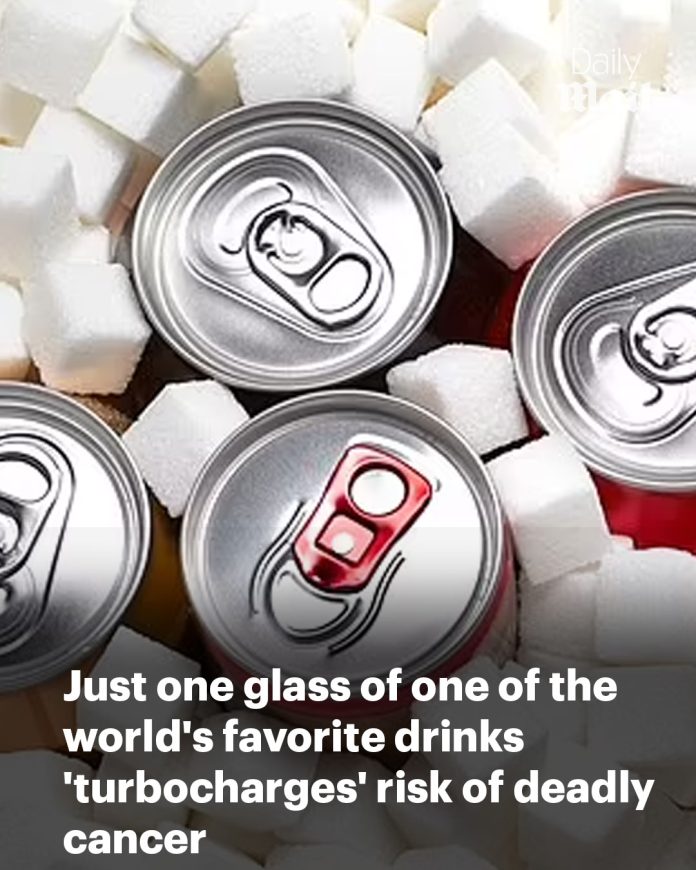Colorectal cancer, encompassing cancers of the colon and rectum, is among the leading causes of cancer-related deaths worldwide. While genetics and age are well-known risk factors, lifestyle choices, particularly dietary habits, play a significant role in the development of this disease. Recent studies have shed light on the potential dangers of certain beverages, notably sugary drinks and alcohol, in increasing the risk of colorectal cancer.
Sugary Beverages and Colorectal Cancer
A growing body of research suggests a strong link between the consumption of sugar-sweetened beverages and an elevated risk of colorectal cancer, especially among younger adults.

- Early-Onset Colorectal Cancer: A study led by Dr. Emma Schatoff at New York City’s Memorial Sloan Kettering Cancer Center found that individuals under 50 who consumed high amounts of sugary foods and drinks were more likely to be diagnosed with advanced-stage colorectal cancer. The research indicated that a daily intake of sugary beverages, such as soda, was associated with a higher likelihood of metastatic disease at diagnosis.
- Adolescent Consumption: Another study from Washington University School of Medicine highlighted that women who consumed two or more servings of sugar-sweetened beverages daily during adolescence had more than double the risk of developing colorectal cancer before age 50 compared to those who consumed less than one serving per week.
- Biological Mechanisms: Laboratory studies have demonstrated that high-fructose corn syrup, a common sweetener in many beverages, can directly promote tumor growth in the colon. This effect occurs independently of obesity, suggesting that sugar itself may have carcinogenic properties.
Alcohol Consumption and Colorectal Cancer
Alcohol is a known carcinogen, and its association with various cancers, including colorectal cancer, has been extensively documented.
- Increased Mortality Rates: Research from the Sylvester Comprehensive Cancer Center revealed that alcohol-related cancer deaths in the U.S. nearly doubled from 1990 to 2021, with colorectal cancer being one of the most affected types.
- Dose-Dependent Risk: The risk of colorectal cancer increases with the amount of alcohol consumed. A meta-analysis indicated that each 10-gram increase in daily alcohol intake was associated with a 7% increase in colorectal cancer risk.
- Mechanisms of Carcinogenesis: Alcohol is metabolized into acetaldehyde, a toxic compound that can damage DNA and promote cancer development. Additionally, alcohol can cause inflammation, impair nutrient absorption, and disrupt the gut microbiome, all of which may contribute to carcinogenesis.
Public Awareness and Recommendations
Despite the mounting evidence, public awareness of the link between these beverages and colorectal cancer remains low.
- Lack of Awareness: Surveys indicate that less than half of Americans recognize alcohol consumption as a cancer risk factor. Awareness regarding sugary beverages is similarly limited.
- Guidelines: Health organizations recommend limiting the intake of sugary drinks and alcohol. The U.S. Dietary Guidelines advise no more than one alcoholic drink per day for women and two for men. Reducing consumption of sugar-sweetened beverages is also encouraged to lower cancer risk.
To mitigate the risk of colorectal cancer:

- Dietary Changes: Opt for water, herbal teas, or other non-sugary beverages. Limit alcohol intake and avoid binge drinking.
- Regular Screening: Begin colorectal cancer screenings at age 45 or earlier if there’s a family history or other risk factors.
- Healthy Lifestyle: Maintain a balanced diet rich in fruits, vegetables, and whole grains. Engage in regular physical activity and avoid smoking.
The beverages we consume daily can have profound effects on our health. Emerging research underscores the importance of being mindful of sugary and alcoholic drinks, given their potential role in increasing colorectal cancer risk. By making informed choices and adopting healthier habits, individuals can take proactive steps toward reducing their cancer risk and promoting overall well-being.

















